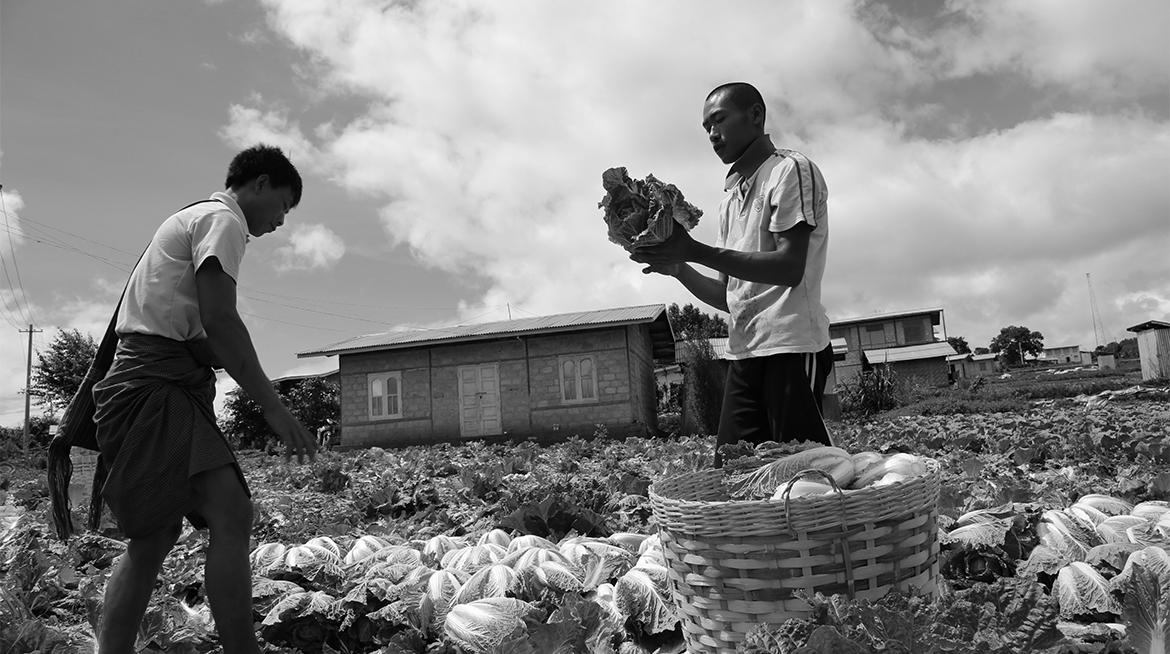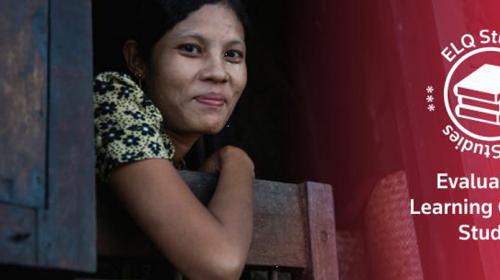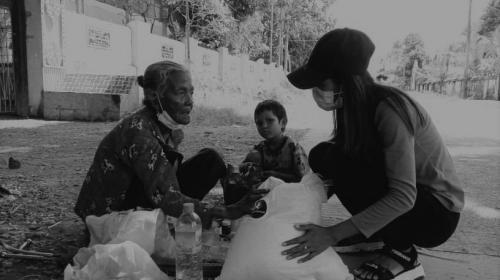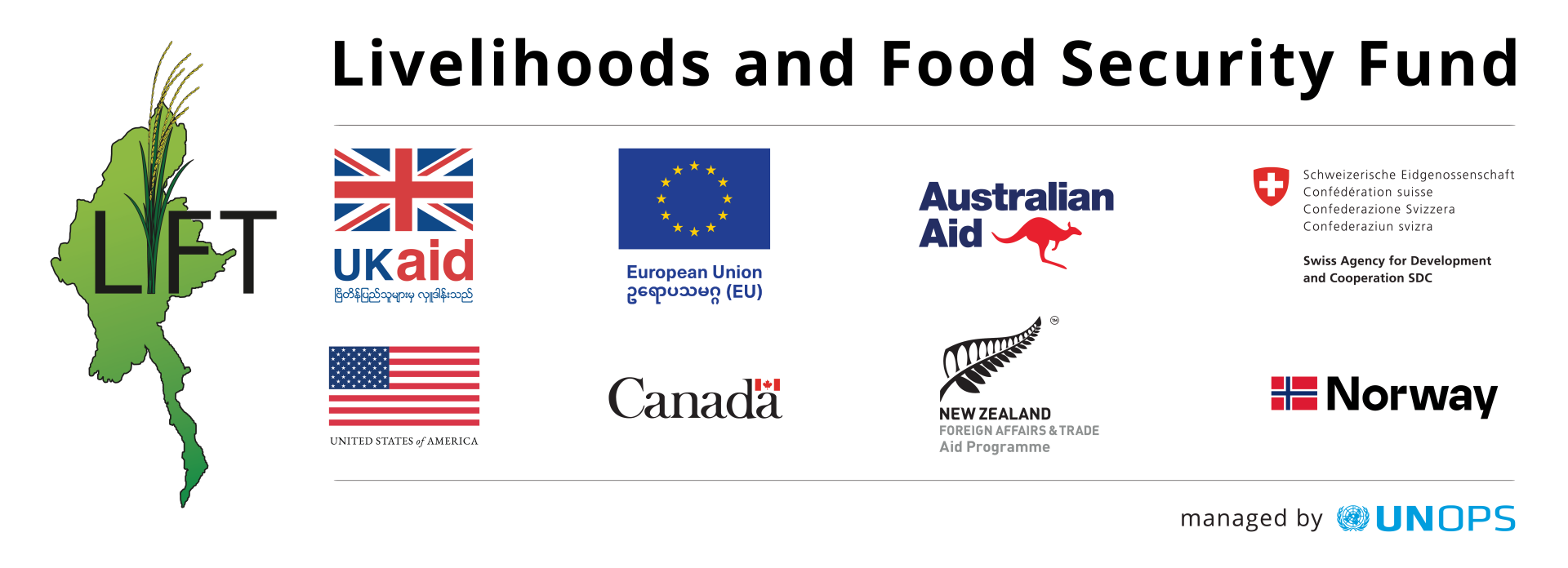
(Myanmar version below)
On 1 February, Myanmar’s military announced a State of Emergency and detained members of the government. The events of 1 February have led to an unfolding and worsening political crisis and represent a serious reversal of the progress made in Myanmar’s transition and socio-economic development over recent years. The livelihoods and food security of Myanmar’s rural population is also at risk.
The ongoing political crisis is straining the rural economy of Myanmar through multiple disruptions such as food market failure, halted supplies, reduced access to inputs, curfew restrictions and volatile prices in the agricultural sector, all of which play a key role in rural livelihoods. The food security and nutrition situation for smallholder farmers and vulnerable rural families, already fragile due to the prolonged COVID 19 pandemic, is further undermined and threatens a devastating social and economic crisis. With already high poverty rates of 26% nationwide, likely twice as high in many places, Myanmar could suffer a stark increase in vulnerability due to dramatic reductions in economic activities, employment and remittances.
Risks to agriculture production and productivity
LIFT’s rapid assessment reveals the negative impact on Myanmar’s agricultural production and productivity, as the crisis affects smallholder farmers who produce most of the country’s agricultural output. Hampered access to fuel, seeds and fertilizers may escalate further disruptions to agricultural production and supply chains.
- Volatile food prices: Prices for staple foods such as rice and cooking oil rose up to 10-15% on average during February while the prices of palm oil, largely consumed by low-income families, have nearly doubled. Rice trade and supply throughout the country is affected by bank closures and the halt of transport. On the contrary, vegetable prices are falling up to 40% due to disruptions to transportation and limited access to key markets.
- Hampered access to inputs: Smallholder farmers across Myanmar face difficulties accessing agricultural products and inputs such as seeds, fuel, pesticides and fertilizer, loans, machinery, and equipment which may lead to a decrease in agricultural production in the upcoming season and further price shocks.
- Increased prices of inputs: Suppliers anticipate possible shortages of agricultural inputs (fertilizers and seeds) in the coming cultivation season (i.e. May-June) and an increase in prices due to high dependence on imports. This situation will be further exacerbated by extended commodity delivery time and currency depreciation (already down by 10% since 1 February), with an expected volatility in prices of all imported agricultural inputs.
- Halted financial services: Serious challenges are reported in the availability of financial services, particularly in rural areas, as most banks are closed with only limited ATM services available and microfinance institutions are considerably reducing their operations. The situation is anticipated to further deteriorate.
- Fuel shortages: As Myanmar relies on as much as 98% of its fuel consumption on gasoline and diesel imports, it is estimated that fuel supplies in the country will run short in two months due to suspension of oil imports following the US sanctions and financial restrictions.
- Rising transportation cost and disruptions to transportation services: Fuel shortages could cause a knock-on effect resulting in higher transportation costs, which have already seen an increase of 40-50% for short- and long distances due to rising risks of commodity deliveries. Farmers also report considerable constraints to supply their produce due to travel restrictions, reduced delivery options, increasing transportation costs and lower demand for the commodities. This will adversely impact supply chains, resulting in soaring food and input prices and affecting people’s ability to buy food.
Risks to purchasing power of poor smallholders
Instability caused by the political crisis will have further negative spillover effects on income distribution and increasing poverty, aggravated by the lack of security, loss of employment and business closures across many sectors. Should the current price situation continue then poor and vulnerable families, who already spend up to 75% of their income on food, will be disproportionately affected as their food insecurity will greatly intensify.
- Cut-off remittances: Formal remittances sent by migrants, constituting about 2.8% of GDP (increasing substantially if the billions in informal remittances flows are included) sharply reduced during the COVID-19 pandemic and might come to a complete standstill with bank and money transfer organisations now heavily disrupted. This will cut a lifeline for the millions of Myanmar families who rely on remittances as a main source of income, particularly impacting women in poor rural areas. It remains unclear whether migrant workers and their families can adjust and make use of informal remittance service providers such as the “hundi system” (a trust-based money transfer system operated by unlicensed financial brokers) during the closure of financial institutions.
- Reduced incomes: Vendors, shopkeepers, vegetable sellers and tea shops are suffering from the business slowdown and income cuts due to curfew restrictions and disruptions to supply. This causes a knock-on effect as daily labourers are no longer able to earn. Vegetable growers and sellers also face difficulties selling their produce due to transportation constraints, reduced demand and market failure. Paddy and pulses trade has stagnated while fish trade is at an almost stand still and border trade has nearly stopped, resulting in sharp reductions in incomes. This will significantly limit peoples’ access to food and affect the purchasing power of vulnerable families who already spend a larger share of their income on food.
- Rural finances at risk: There are less loans available in the agri-food system due to disruptions to lending institutions, savings withdrawal and reduced loan repayments/disbursement. Many farmers will prefer to preserve funds for their consumption needs over fulfilling their repayment obligations, and business instability will affect the loan repayments and disbursements. Debt and informal predatory lending are likely to become an increasing alternative service, particularly for the most vulnerable despite its high cost of service.
(Myanmar language)
ခြိမ်းခြောက်ခံနေရပြီ ဖြစ်သည့် မြန်မာနိုင်ငံ ကျေးလက်ဒေသ အသက်မွေးဝမ်းကျောင်းမှုနှင့် စားနပ်ရိက္ခာ ဖူလုံမှု
ဖေဖော်ဝါရီလ ၁ ရက်နေ့တွင် မြန်မာ့ တပ်မတော်မှ အရေးပေါ် အခြေအနေ ကြေညာ လိုက်ပြီး အစိုးရအဖွဲ့ဝင်များအား ဖမ်းဆီး ခဲ့ပါသည်။ ထို ဖေဖော်ဝါရီလ ၁ ရက်နေ့ တွင် ဖြစ်ပွားခဲ့သည့် ဖြစ်ရပ်များကြောင့် ဆိုးရွားသည့် နိုင်ငံရေး အကျပ်အတည်း ဖြစ်ပေါ် စေခဲ့ပြီး မကြာသေးမီ နှစ်များအတွင်း ဖြစ်ပေါ်တိုးတက်ခဲ့သည့် မြန်မာနိုင်ငံ၏ အသွင်ကူးပြောင်းရေးနှင့် လူမှုစီးပွား ဖွံ့ဖြိုး တိုးတက်ရေး ဆိုင်ရာ တိုးတက်မှုများအား စိုးရိမ်ဖွယ်ရာ ဆိုးဆိုးရွားရွား ပြောင်းပြန်လှန် ပစ်ခြင်းခံလိုက်ရပါတော့သည်။ မြန်မာနိုင်ငံ ကျေးလက်နေ ပြည်သူလူထု၏ အသက်မွေးဝမ်းကျောင်းမှုနှင့် စားနပ်ရိက္ခာ ဖူလုံမှုတို့သည်လည်း အန္တရာယ် ရှိနေပြီ ဖြစ်သည်။
ဖြစ်ပွားနေဆဲ နိုင်ငံရေး အကျပ်အတည်းသည် ကျေးလက်နေပြည်သူတို့၏ အသက်မွေးဝမ်းကျောင်းမှုတွင် အရေးပါသည့် အချက်များ ဖြစ်သော စားနပ်ရိက္ခာ ဈေးကွက် ပျက်ယွင်းခြင်း၊ ကုန်စည်စီးဆင်းမှု ရပ်ဆိုင်းခြင်း၊ သွင်းအားစုများ ရရှိမှု လျော့ကျ သွားခြင်း၊ ညမထွက်ရ အမိန့် ထုတ်ပြန် ကန့်သတ်ခြင်း နှင့် စိုက်ပျိုးရေးကဏ္ဍတွင် ဈေးနှုန်းများ မတည်မငြိမ် ဖြစ်ခြင်းတို့ကဲ့သို့ သော ကမောက်ကမ ဖြစ်ရပ်များ အများအပြား ဖြစ်ပေါ်စေခြင်းဖြင့် မြန်မာနိုင်ငံ၏ ကျေးလက် စီးပွားရေး အား ထိခိုက်စေလျက် ရှိပါသည်။ ကာလရှည်ကြာ ဖြစ်ပွားလျက်ရှိသည့် COVID -19 ကမ္ဘာ့ကပ်ရောဂါ အခြေအနေကြောင့် လုပ်ကွက်ငယ် တောင်သူ များနှင့် ကျေးလက်နေ အားနည်းထိခိုက်လွယ် မိသားစုများ၏ အားလျော့ပြီးဖြစ်သည့် စားနပ်ရိက္ခာ ဖူလုံမှုနှင့် အာဟာရဖူလုံမှု ဆိုင်ရာ အခြေအနေမှာ ပိုမို၍ ယုတ်လျော့လာခဲ့ပြီး ဆိုးရွားပြင်းထန်သည့် လူမှုရေးနှင့် စီးပွားရေး အကျပ်အတည်း ဖြစ်လာ နိုင်ချေ အန္တရာယ် နိမိတ် ပြနေပြီ ဖြစ်ပါသည်။ တစ်နိုင်ငံလုံး အတိုင်းအတာဖြင့် ဆင်းရဲနွမ်းပါးမှုနှုန်း ၂၆% ဖြင့် ဆိုးရွားလျက်ရှိပြီး နေရာဒေသ အနှံ့အပြားတွင် ထို့ထက် နှစ်ဆမျှ ဆိုးရွားနိုင်ချေ ရှိနေသောကြောင့် စီးပွားရေး လုပ်ငန်းများ၊ အလုပ်အကိုင် အခွင့်အလမ်းနှင့် ငွေလွှဲပေးပို့မှုများတွင် သိသာထင်ရှားစွာ လျော့နည်းသွားသဖြင့် မြန်မာနိုင်ငံသည် အားနည်း ထိခိုက် လွယ်မှု တွင် သိသိသာသာ မြင့်တက်မှု ကို ခံစားရနိုင်ပါသည်။
စိုက်ပျိုးထုတ်လုပ်မှုနှင့် ကုန်ထုတ်စွမ်းအား ဆိုင်ရာ ဆုံးရှုံးရနိုင်ချေ အန္တရာယ်များ
အကျပ်အတည်းကြောင့် နိုင်ငံ၏ စိုက်ပျိုးရေး ထွက်ကုန် အများဆုံး ထုတ်လုပ်သူများဖြစ်သည့် လုပ်ကွက်ငယ် တောင်သူများ အား ထိခိုက်စေခဲ့သဖြင့် မြန်မာနိုင်ငံ၏ စိုက်ပျိုး ထုတ်လုပ် မှုနှင့် ကုန်ထုတ်စွမ်းအား တို့တွင် ဆိုးရွားသည့် အကျိုး သက်ရောက်မှု များ ရှိခဲ့ကြောင်းကို LIFT ၏ Rapid assessment အကဲဖြတ်ဆန်းစစ်မှု မှ ဖော်ထုတ်ခဲ့ပါသည်။ လောင်စာဆီ၊ မျိုးစေ့နှင့် ဓာတ်မြေဩဇာ ရရှိမှု တွင် နှောင့်နှေးသွားခြင်းက စိုက်ပျိုးထုတ်လုပ်မှု နှင့် ကုန်စည်စီးဆင်းမှု ကွင်းဆက်များကို ထပ်မံ၍ တစ်စထက်တစ်စ ယုတ်လျော့စေမည် ဖြစ်ပါသည်။
- စားသောက်ကုန်ဈေးများ မတည်ငြိမ်မှု- ဖေဖော်ဝါရီလတွင် ဆန်နှင့် စားသုံးဆီ ကဲ့သို့သော အဓိက စားသောက်ကုန် ဈေးနှုန်းများသည် ပျမ်းမျှ ၁၀%-၁၅% အထိ မြင့်တက်ခဲ့ပြီး ဝင်ငွေနည်းမိသားစုများ အများဆုံး စားသုံးသည့် စားအုန်းဆီဈေးနှုန်းများ နှစ်ဆ နီးပါး မြင့်တက်ခဲ့ပါသည်။ ဘဏ်များ ပိတ်ခြင်းနှင့် သယ်ယူပို့ဆောင်ရေးလုပ်ငန်းများ ရပ်တန့်သွားခြင်းတို့ကြောင့် နိုင်ငံ အနှံ့အပြားတွင် ဆန်ရောင်းဝယ်မှုနှင့် ပို့ဆောင်ထောက်ပံ့မှုတို့အား ထိခိုက်စေခဲ့ပါသည်။ ဟင်းသီးဟင်းရွက်ဈေးနှုန်းများ မှာမူ ယင်းအခြေအနေနှင့် ပြောင်းပြန်ဖီလာ ဖြစ်ပြီး သယ်ယူပို့ဆောင်ရေးများ ရပ်တန့်သွားခြင်းနှင့် အဓိက ဈေးကွက်များ လက်လှမ်းမီမှုတွင် အကန့်အသတ်ရှိခြင်းတို့ကြောင့် ၄၀% အထိ ကျဆင်းခဲ့ပါသည်။
- သွင်းအားစုများ ရရှိမှု နှောင့်နှေးခြင်း - မြန်မာနိုင်ငံ အနှံ့အပြားတွင် ရှိသည့် လုပ်ကွက်ငယ်တောင်သူများ အနေဖြင့် မျိုးစေ့ များ၊ လောင်စာဆီ၊ ပိုးသတ်ဆေးနှင့် ဓာတ်မြေဩဇာ၊ ချေးငွေများ၊ စိုက်ပျိုးရေး စက်ပစ္စည်းများနှင့် ကိရိယာများ၊ စိုက်ပျိုးရေး ထုတ်ကုန်များ နှင့် သွင်းအားစုများ ရရှိရန် အခက်အခဲများ ရင်ဆိုင်ကြုံတွေ့နေရသဖြင့် လာမည့် စိုက်ပျိုးရာသီတွင် စိုက်ပျိုး ထုတ်လုပ်မှု လျော့ကျခြင်းနှင့် ၎င်းနှင့် ဆက်စပ်၍ ဈေးနှုန်း အတက်အကျ မြန်ခြင်းတို့ဆီသို့ ဦးတည်မည် ဖြစ်ပါသည်။
- သွင်းအားစု ဈေးနှုန်းများ မြင့်တက်ခြင်း - ကုန်ပစ္စည်းပေးသွင်းသူများက လာမည့် စိုက်ပျိုးရာသီ (မေလမှ ဇွန်လအတွင်း) စိုက်ပျိုးရေး သွင်းအားစုများ (ဓာတ်မြေဩဇာ နှင့် မျိုးစေ့များ) ပြတ်လပ်နိုင်ချေကို ကြုံတွေ့လာနိုင်ပြီး သွင်းကုန်များအပေါ် အလွန်အမင်း အားထားနေရသဖြင့် ဈေးနှုန်းများ မြင့်တက်လာလိမ့်မည်ဟု ကြိုတင် မှန်းဆထားပါသည်။ ပြည်ပမှ တင် သွင်း လာသည့် စိုက်ပျိုးရေးသွင်းအားစုများ အားလုံး၏ ဈေးနှုန်းများ မတည်မငြိမ် ဖြစ်မည်ဟု မျှော်မှန်းထားခြင်းနှင့် အတူ ကုန်ပစ္စည်းများ ပို့ဆောင်သည့် အချိန် ပိုမိုကြာမြင့်စေခြင်း နှင့် မြန်မာငွေ တန်ဖိုးကျဆင်းခြင်း (ဖေဖော်ဝါရီလ ၁ရက်နေ့ မှ စတင်၍ ၁၀% ကျဆင်းနေခဲ့ပြီး ဖြစ်သည့်) တို့ကြောင့် ဤအခြေအနေမှာ ပို၍ ပို၍ ဆိုးရွားလာမည် ဖြစ်ပါသည်။
- ငွေကြေးဆိုင်ရာ ဝန်ဆောင်မှုများ ရပ်တန့်ခြင်း - ဘဏ်အများစု ပိတ်ထားခြင်း၊ အလိုအလျောက် ငွေထုတ်စက် (ATM) ဝန်ဆောင်မှုများ အကန့်အသတ်ဖြင့်သာ ရရှိနိုင်ခြင်း နှင့် အသေးစား ငွေရေးကြေးရေး လုပ်ငန်းများ လုပ်ငန်းလည်ပတ် ဆောင်ရွက်မှု အလွန်အမင်း လျှော့ချနေခြင်း တို့ကြောင့် အထူးသဖြင့် ကျေးလက်ဒေသများ၌ ငွေကြေးဆိုင်ရာ ဝန်ဆောင်မှု များ ရရှိနိုင်မှု တွင်လည်း ကြီးမားသည့် စိန်ခေါ်မှုများ ရှိနေကြောင်း တွေ့ရှိရပါသည်။ ဤအခြေအနေမှာ ပို၍ပို၍ ဆိုးရွား လာမည်ဟု မှန်းဆ ထားပါသည်။
- လောင်စာဆီ ပြတ်လပ်မှုများ - မြန်မာနိုင်ငံ အနေဖြင့် လောင်စာဆီ အသုံးပြုမှု၌ ပြည်ပမှ တင်သွင်းသည့် ဓာတ်ဆီနှင့် ဒီဇယ်ဆီများပေါ်တွင် ၉၈% မျှ မှီခိုနေရသဖြင့် အမေရိကန် ပြည်ထောင်စု မှ စီးပွားရေး ပိတ်ဆို့ ဒဏ်ခတ်မှု များနှင့် ငွေကြေး ဆိုင်ရာ ကန့်သတ်ထိန်းချုပ်မှုများကြောင့် လောင်စာဆီ တင်သွင်းမှုများအား ခေတ္တ ရပ်ဆိုင်း လိုက်သဖြင့် နှစ်လအတွင်း လောင်စာဆီ ပြတ်လပ်သွားမည်ဟု ခန့်မှန်းထားပါသည်။
-
သယ်ယူပို့ဆောင်ရေး စရိတ်များ မြင့်တက်လာခြင်းနှင့် သယ်ယူပို့ဆောင်ရေး ဝန်ဆောင်မှုများ ပြတ်တောက်ခြင်းများ - ကုန်ပစ္စည်း သယ်ယူပို့ဆောင်ခြင်း များတွင် ဆုံးရှုံးရနိုင်ချေ အန္တရာယ် မြင့်တက်လာခြင်း ကြောင့် ခရီးတို နှင့် ခရီးဝေး ပို့ဆောင်ခများ ၄၀% - ၅၀% အထိ မြင့်တက်လာခဲ့ပြီး လောင်စာဆီ ပြတ်လပ်မှုများ၏ နောက်ဆက်တွဲ အကျိုးဆက် အဖြစ် သယ်ယူပို့ဆောင်ရေး စရိတ်များ ပိုမို မြင့်တက်လာမည် ဖြစ်ပါသည်။ တောင်သူများ အနေဖြင့်လည်း အသွားအလာ ကန့် သတ် မှုများ၊ ပစ္စည်းများ ပို့ဆောင်သည့် နည်းလမ်းများ လျော့နည်းလာခြင်း၊ သယ်ယူပို့ဆောင်ရေး စရိတ်များ မြင့်တက် လာခြင်းနှင့် ကုန်ပစ္စည်း ဝယ်လိုအား ကျဆင်းလာခြင်း တို့ကြောင့် ၎င်းတို့၏ ထုတ်ကုန်များ ပေးသွင်းရာတွင် ကြီးမားသည့် အကန့်အသတ်များ ရှိကြောင်း အစီရင်ခံတင်ပြကြပါသည်။ သို့ဖြင့် ကုန်စည်စီးဆင်းမှု ကွင်းဆက် များအပေါ် ပြောင်းပြန် အကျိုးသက်ရောက်မှု ရှိမည်ဖြစ်၍ စားနပ်ရိက္ခာများနှင့် သွင်းအားစု ဈေးနှုန်းများ အဆမတန် မြင့်တက်စေပြီး ပြည်သူ များ၏ စားနပ်ရိက္ခာ ဝယ်ယူနိုင်စွမ်းအားကိုလည်း ထိခိုက်စေမည် ဖြစ်ပါသည်။
ဆင်းရဲနွမ်းပါးသည့် လုပ်ကွက်ငယ် တောင်သူများ၏ ဝယ်ယူနိုင်စွမ်းဆိုင်ရာ ဆုံးရှုံးရနိုင်ချေများ
နိုင်ငံရေး အကျပ်အတည်းကြောင့် ဖြစ်သည့် မတည်ငြိမ်မှုသည် လုံခြုံစိတ်ချရမှု ကင်းမဲ့ခြင်း၊ အလုပ်အကိုင်များ ဆုံးရှုံးခြင်း နှင့် ကဏ္ဍအများအပြားတွင် စီးပွားရေးလုပ်ငန်းများ ပိတ်သိမ်းခြင်း တို့ကြောင့် နိုင်ငံ၏ ဝင်ငွေ ခွဲဝေမှု နှင့် ဆင်းရဲနွမ်းပါးမှု အခြေအနေ ပိုမိုဆိုးရွားစွာ မြင့်တက်လာခြင်းတို့အပေါ် ဆိုးကျိုး ပျံ့နှံ့မှုများ ထပ်မံ ဖိစီးစေပါသည်။ လက်ရှိ ဖြစ်ပေါ်နေသည့် ဈေးနှုန်း အခြေအနေများ ဆက်လက် ဖြစ်ပေါ်နေပါက ဝင်ငွေ၏ ၇၅% အား စားနပ်ရိက္ခာအတွက် အသုံးပြုနေကြသည့် ဆင်းရဲ နွမ်းပါးပြီး အားနည်းထိခိုက်လွယ်သည့် မိသားစုများ အပေါ် အချိုးမညီမျှစွာ သက်ရောက်မှု ရှိမည်ဖြစ်သောကြောင့် ၎င်းတို့၏ စားနပ်ရိက္ခာ မဖူလုံမှုမှာ အလွန်အမင်း ဆိုးရွားလာမည် ဖြစ်သည် ။
- ငွေလွှဲပေးပို့မှုများ ရပ်ဆိုင်းခြင်း- ဂျီဒီပီ၏ ၂.၈ % ရှိသည့် ရွှေ့ပြောင်းသွားလာသူများ ထံမှ ပေးပို့သည့် တရားဝင် ငွေလွှဲ ပေးပို့မှုများ (တရားမဝင် လမ်းကြောင်းမှ ပေးပို့သည့် ငွေလွှဲစီးဆင်းမှုများပါ ထည့်သွင်း စဉ်းစားလျှင် သိသိသာသာ မြင့်တက် လျက်ရှိသည့် ငွေလွှဲပေးပို့မှု) မှာ COVID- 19 ကပ်ရောဂါ ကာလအတွင်း သိသိသာသာ လျော့နည်းသွားခဲ့ပြီး ဘဏ်များနှင့် ငွေလွှဲဝန်ဆောင်မှုပေးသည့် လုပ်ငန်း အများအပြားတို့ ယခုအခါတွင် ရပ်ဆိုင်းသွားပြီသဖြင့် ငွေလွှဲ ပေးပို့မှုများ လုံးဝဥဿုံ ရပ်တန့်သွားနိုင်ပါသည်။ သို့ဖြင့် ငွေလွှဲပေးပို့မှုအပေါ် အဓိကထား မှီခိုနေရသည့် သန်းပေါင်း များစွာသော မြန်မာ မိသားစုများ၊ အထူးသဖြင့် ဆင်းရဲနွမ်းပါးသည့် ကျေးလက်ဒေသများတွင် နေထိုင်သည့် အမျိုးသမီးများ၏ ဘဝရပ်တည်မှု အတွက် ထိခိုက်နစ်နာစေမည် ဖြစ်ပါသည်။ ငွေကြေးဆိုင်ရာ လုပ်ငန်းများ၏ လုပ်ငန်း လည်ပတ်မှု ရပ်ဆိုင်းနေသည့် ကာလအတွင်း ရွှေ့ပြောင်းလုပ်သားများနှင့် ၎င်းတို့၏ မိသားစုများ အနေဖြင့် “ဟွန်ဒီစနစ်” (လိုင်စင်မဲ့ ငွေကြေးပွဲစားများမှ လုပ်ကိုင်သည့် ယုံကြည်မှုပေါ် အခြေခံသည့် ငွေလွှဲစနစ်) ကဲ့သို့သော တရားမဝင် ငွေလွှဲ ဝန်ဆောင်မှုများအား လိုက်လျောညီထွေစွာ အသုံးပြုမည် မပြုမည် ဆိုသောအချက်မှာမူ ရှင်းရှင်းလင်းလင်းမရှိသေးပါ။
- ဝင်ငွေများလျော့နည်းလာခြင်း- ဈေးသည်များ၊ ဈေးဆိုင်ပိုင်ရှင်များ၊ ဟင်းသီးဟင်းရွက် ရောင်းချသူများ၊ လက်ဖက်ရည်ဆိုင် များသည် ညမထွက်ရအမိန့် ထုတ်ပြန်ခြင်း နှင့် ကုန်စည်စီးဆင်းမှုများ ပြတ်တောက်ခြင်းများကြောင့် စီးပွားရေး ကျဆင်းမှု နှင့် ဝင်ငွေ လျော့ကျမှု ဒဏ်အား ခံစားနေကြရပါသည်။ ယင်းသို့ဖြင့် နေ့စားအလုပ်သမားများ ဝင်ငွေ မရှိတော့သည့် အဖြစ်မျိုးကဲ့သို့ နောက်ဆက်တွဲ အကျိုးဆက်များ ဖြစ်စေပါသည်။ ဟင်းသီးဟင်းရွက် စိုက်ပျိုးသူများနှင့် ရောင်းချသူများ သည်လည်း သယ်ယူပို့ဆောင်ရေး ကန့်သတ်ချက်များ၊ ဝယ်လိုအား ကျဆင်းခြင်းနှင့် ဈေးကွက် ပျက်ခြင်းတို့ကြောင့် ၎င်းတို့ ၏ ထွက်ကုန်များ ရောင်းချရန်အတွက် အခက်အခဲများစွာ ရင်ဆိုင်နေကြရပါသည်။ ဆန်စပါး နှင့် ပဲအမျိုးမျိုး ကုန်သွယ်မှု မှာ တန့်နေပြီး၊ ငါးရောင်းဝယ်မှုမှာ လုံးဝနီးပါး ငြိမ်သက် နေကာ၊ နယ်စပ်ကုန်သွယ်ရေးမှာလည်း ရပ်လုနီးပါး ဖြစ်နေသဖြင့် ဝင်ငွေများ သိသိသာသာ လျော့ကျလျက် ရှိပါသည်။ ယင်းမှာ ပြည်သူလူထု၏ စားနပ်ရိက္ခာ လက်လှမ်းမီ ရရှိမှုကို သိသာထင်ရှားစွာ အကန့်အသတ် ဖြစ်စေပြီး စားနပ်ရိက္ခာအတွက် ၎င်းတို့၏ ဝင်ငွေ အများစုကို အသုံးပြုနေ ကြရသည့် အားနည်းထိခိုက်လွယ်သည့် မိသားစုများ၏ ဝယ်ယူနိုင်စွမ်းအပေါ် သိသိသာသာ သက်ရောက်မှု ရှိမည် ဖြစ်ပါ သည်။
-
ကျေးလက်ဒေသ ငွေရေးကြေးရေးလုပ်ငန်းများ ဆုံးရှုံးရနိုင်ချေ အန္တရာယ် ရှိခြင်း - ချေးငွေထုတ်ပေးသည့် အသင်း အဖွဲ့များ ရပ်ဆိုင်းသွားခြင်း၊ စုငွေများ ထုတ်ယူခြင်း နှင့် ချေးငွေ ပြန်ဆပ်ခြင်း/ငွေထုတ်ပေးခြင်းတို့ လျော့ကျ သွားသဖြင့် စိုက်ပျိုး ရိက္ခာ စနစ်များအတွင်း ရရှိနိုင်သည့် ချေးငွေများ လျော့နည်းလာပါသည်။ တောင်သူအများအပြား အနေဖြင့် ချေးငွေ ပြန်ဆပ်ရန် တာဝန်များထက် ၎င်းတို့ လိုအပ်သည့်နေရာတွင် အသုံးပြုနိုင်ရန်အတွက် ငွေများ သီးသန့် ဖယ်ထားရန် ပိုမို လိုလားမည်ဖြစ်ပြီး စီးပွားရေးလုပ်ငန်း မတည်ငြိမ်ခြင်းကြောင့် ချေးငွေ ပြန်ဆပ်ခြင်းနှင့် ငွေ ထုတ်ပေးခြင်းတို့အပေါ် သက်ရောက်မှု ရှိလာမည် ဖြစ်ပါသည်။ တရားမဝင် အမြတ်ကြီးစား ငွေချေးခြင်းနှင့် အကြွေးယူခြင်း တို့သည် ဝန်ဆောင်မှု စရိတ် မြင့်မားသော်လည်း အထူးသဖြင့် အားနည်းထိခိုက်လွယ်မှု အများဆုံးရှိသူများ ပိုမိုအသုံးပြုလာမည့် သမားရိုးကျ မဟုတ် သော ဝန်ဆောင်မှု ရယူသည့် နည်းလမ်းတစ်ခု ဖြစ်လာနိုင်ချေ ရှိပါသည်။





